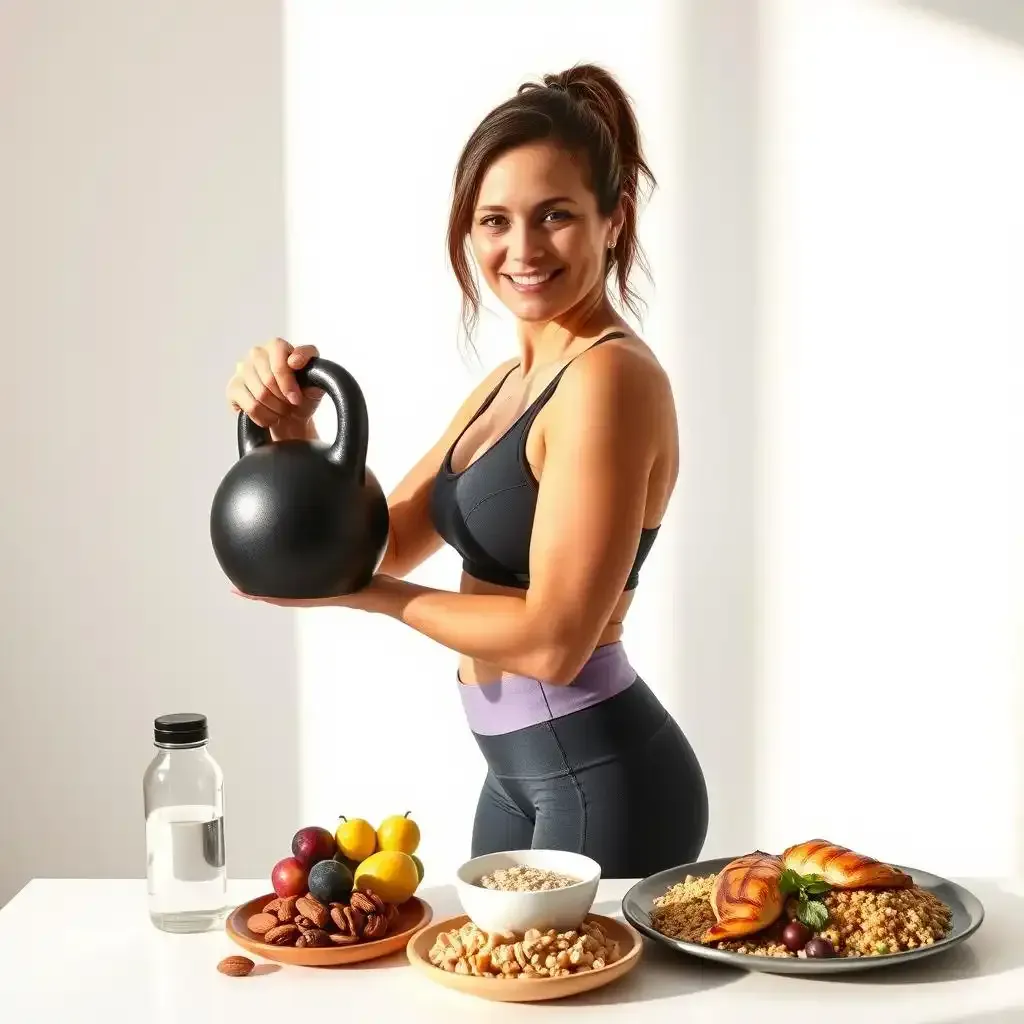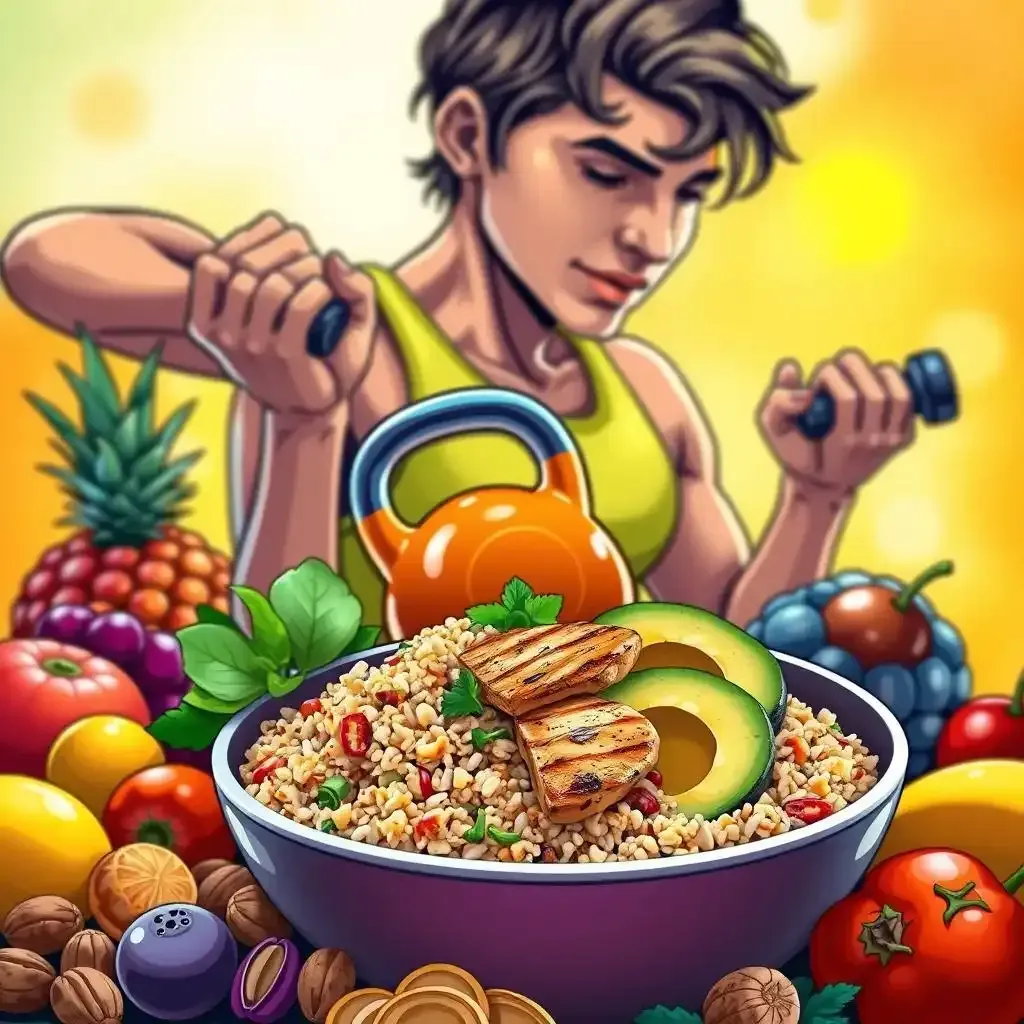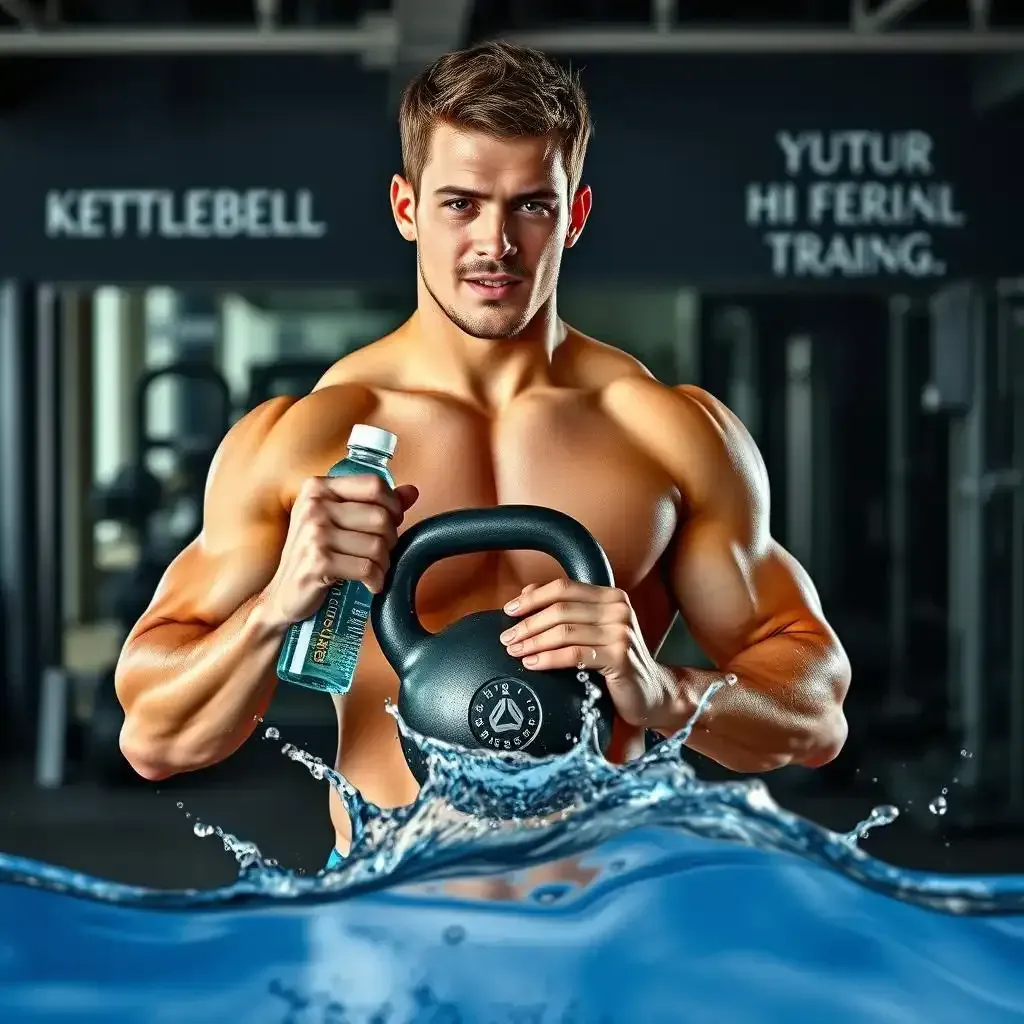Table of Contents
So, you're crushing those kettlebell swings and snatches, feeling the burn, and loving the results? Awesome! But have you thought about how what you eat impacts your workouts and recovery? Getting the right nutrition is just as important as the kettlebell workout itself. Think of it like this: your body's a high-performance machine; you wouldn't put regular gas in a Ferrari, would you? This article will break down the essentials of kettlebell workout nutrition, helping you optimize your performance and get the most out of your sweat sessions. We'll cover everything from the right balance of macros to hydration strategies and even touch on helpful supplements. Ready to fuel your fitness trip and become a kettlebell warrior? Let’s explore in! Remember to always consult a healthcare professional before making significant changes to your diet or exercise routine. For more tips and tricks, check out kettlebellworkout.homes!
Fueling Your Kettlebell Workout: Nutrition Strategies for Optimal Results

Fueling Your Kettlebell Workout Nutrition Strategies For Optimal Results
Okay, so you're all fired up about kettlebells, right? You're swinging, you're snatching, you're feeling amazing. But guess what? Your body's a super-powered engine, and that engine needs the right fuel to perform at its best. Think of it like this: you wouldn't put regular gas in a race car, would you? You need high-octane fuel to win the race! Similarly, your kettlebell workouts demand top-notch nutrition. It's not just about *feeling* good; it's about optimizing your performance, building muscle, and recovering faster. I'm talking serious gains here, people!
Let’s start with the basics. Think of your plate as a balanced team. We've got protein, the muscle builders; carbs, the energy givers; and healthy fats, the unsung heroes of muscle repair and hormone production. Want to know a secret? Don't be afraid of carbs! They're your body's primary energy source, especially during those intense kettlebell sessions. I usually aim for complex carbs like sweet potatoes or quinoa, not just sugary junk. And remember, you need all three: protein, carbs and healthy fats. Check out our guide to beginner kettlebell routines to get your workout started!
Macronutrient | Why it's important | Good sources |
|---|---|---|
Protein | Builds and repairs muscle tissue | Chicken, fish, beans, lentils |
Carbohydrates | Provides energy for workouts | Sweet potatoes, brown rice, quinoa |
Healthy Fats | Supports hormone production and cell function | Avocado, nuts, olive oil |
Timing is also key. Don't stuff yourself right before a workout; that's a recipe for disaster (trust me, I've been there!). Aim for a light meal a couple of hours beforehand, and then refuel with a protein and carb-rich snack after your session. Think of it as rewarding your muscles after a hard day's work. Need some ideas? Check out our kettlebell nutrition tips for more detail!
And finally, let's talk about hydration. Water is your best friend, always. Dehydration can seriously impact your performance and recovery. I carry a water bottle everywhere. Seriously, it's practically glued to my hand! Aim to sip on water throughout the day and especially before, during, and after your workout. This helps keep you going and helps your body recover. For even more tips, check out our guide to kettlebell hydration tips.
- Eat a balanced diet with protein, carbs, and healthy fats.
- Time your meals strategically.
- Stay super hydrated!
"The body achieves what the mind believes." – Napoleon Hill. This quote really hits home when it comes to your fitness progression. Believe in your ability to succeed, and nourish your body accordingly.
Kettlebell Workout Nutrition: Macros and Meal Timing

Kettlebell Workout Nutrition Macros And Meal Timing
Macronutrient Mayhem: The Protein, Carb, and Fat Trio
Okay, let's talk about food—the fuel that powers your kettlebell workouts. It's not just about eating; it's about eating *smart*. Think of your body as a high-performance sports car. You wouldn't fill it with regular gas, would you? You need premium fuel—and that's where the macronutrients come in: protein, carbohydrates, and healthy fats. Protein is your muscle-building superhero, carbs are your energy powerhouses, and healthy fats are essential for hormone production and keeping things running smoothly. I usually aim for a balance of all three, focusing on whole, unprocessed foods. You know, the good stuff!
Let me give you an example: After a killer kettlebell workout, I love a big bowl of quinoa with grilled chicken and some avocado. The quinoa provides complex carbs for energy replenishment, the chicken packs a protein punch for muscle repair, and the avocado adds healthy fats for hormone balance. It's a delicious and effective way to refuel my body. Want more delicious ideas? Check out our page for more recipes. Need a workout plan to get started? Check out our kettlebell workout plan.
Macronutrient | Role in Kettlebell Training | Example Sources |
|---|---|---|
Protein | Muscle repair and growth | Chicken, fish, lentils, Greek yogurt |
Carbohydrates | Energy for intense workouts | Sweet potatoes, brown rice, quinoa, oats |
Healthy Fats | Hormone production, nutrient absorption | Avocado, nuts, olive oil, fatty fish |
Meal Timing: Fueling Your Fitness Trip
Timing your meals is just as important as what you eat. Think of it like this: you wouldn't try to run a marathon on an empty stomach, would you? Similarly, you need fuel *before*, *during*, and *after* your kettlebell sessions. Before a workout, a light meal or snack—something easily digestible—is crucial. I usually have a piece of fruit with a handful of nuts about an hour before I start swinging. During longer workouts, I might sip on a sports drink to maintain hydration and electrolytes. Afterward? That's when you really need to refuel! This is when you replenish your glycogen stores and provide your muscles with the building blocks for repair and growth.
Don't wait until you're starving to eat after a workout. Aim for a meal or snack within an hour or two. This is when your muscles are most receptive to nutrients. I usually have a protein shake with some berries or a chicken salad sandwich on whole-wheat bread. Remember, consistency is key. It’s better to eat smaller, more frequent meals throughout the day than to gorge yourself on huge meals less frequently. You want to keep your energy levels stable and support muscle recovery. Check out our guide to kettlebell pre-workout tips for more information. Also, check out our kettlebell post-workout tips for guidance on post-workout nutrition.
- Eat a light snack 1-2 hours before your workout.
- Refuel with a protein and carb-rich meal or snack within 1-2 hours after your workout.
- Stay consistent with your meal timing for optimal results.
Hydration and Electrolyte Balance for Kettlebell Training

Hydration And Electrolyte Balance For Kettlebell Training
Okay, so you've nailed the perfect kettlebell swing, you're feeling strong, but are you properly fueled? It's not just about the protein and carbs; hydration is your secret weapon for killer kettlebell workouts. Think of your body as a garden—it needs water to thrive! Dehydration is a real buzzkill, seriously impacting your performance and leaving you feeling sluggish and weak. I once tried a workout without enough water, and let me tell you, it was a disaster. I felt like I was trying to swing a kettlebell made of lead!
Water is your best friend, especially during intense kettlebell sessions. Aim to drink plenty of water throughout the day, and increase your intake before, during, and after your workouts. Don't wait until you're thirsty; that's already a sign of mild dehydration. Carrying a water bottle with you is a must, especially if you're doing longer workouts. Check out our for more specific advice!
- Drink water throughout the day.
- Increase water intake before, during, and after workouts.
- Carry a water bottle!
But it's not just about water; electrolytes are super important too! Electrolytes, like sodium, potassium, and magnesium, are lost through sweat, and losing too many can lead to muscle cramps and fatigue. Think of electrolytes as the tiny helpers that keep your muscles firing on all cylinders. Replenishing them is key, especially after a long, sweaty session. A good sports drink can help, or you can add a pinch of salt to your water. Too much salt isn't good either, so moderation is key. For more ideas, check out our !
One thing I've learned is to listen to my body. If I feel muscle cramps or unusual fatigue, it could be a sign of electrolyte imbalance. Don't ignore those signals! Adjust your hydration and electrolyte intake accordingly. Remember, everyone is different, so finding the right balance might take some experimentation. But trust me, it's worth it. Feeling your best during your kettlebell workouts is all about finding that sweet spot between proper hydration and electrolyte balance. Want a structured workout plan? Check out our !
Electrolyte | Importance in Kettlebell Training | Good Sources |
|---|---|---|
Sodium | Fluid balance, muscle function | Table salt, sports drinks |
Potassium | Muscle contractions, nerve impulses | Bananas, sweet potatoes, spinach |
Magnesium | Muscle relaxation, energy production | Dark chocolate, almonds, avocados |
Supplements and Recovery Nutrition for Kettlebell Workouts
Okay, so you're killing it with those kettlebell workouts, right? You're strong, you're feeling great, but let's talk about recovery. Think of your muscles like a super-powered sponge: they soak up all that intense training, but they also need time to squeeze out the waste and rebuild themselves stronger. That's where recovery nutrition comes in! It's not just about what you eat *after* a workout; it's about consistently fueling your body to prepare for the next session.
Now, I'm not one for those fancy, expensive supplements that promise miracles. Most of the time, a balanced diet and proper hydration are all you really need. But there are a few things that can give you a little extra edge. For example, protein powder can be a convenient way to boost your protein intake after a tough workout. I usually have a shake with some berries after my sessions to help my muscles repair. Creatine is another one I sometimes use. It helps with strength and strength, and it's pretty well-researched. But remember, supplements are just that—supplements. They should support a healthy diet, not replace it! For more detailed guidance on recovery techniques, check out our guide to kettlebell recovery exercises.
Supplement | Benefits | Considerations |
|---|---|---|
Protein Powder | Supports muscle repair and growth | Choose a high-quality brand with minimal added sugars |
Creatine | Enhances strength and capability | Consult your doctor, especially if you have pre-existing health conditions |
Omega-3 Fatty Acids | Reduces inflammation, supports overall health | Can be obtained through diet (fish, flaxseeds) or supplements |
Beyond supplements, focusing on anti-inflammatory foods can work wonders for recovery. Think of foods like berries, leafy greens, and fatty fish. These are packed with antioxidants and nutrients that fight inflammation, helping your body heal faster. I love adding a big salad with grilled salmon to my post-workout meal. It's delicious and helps me recover quickly! It's all about the whole package: your workouts, the food you eat, and how well you rest. Remember, you need to give your body time to recover to prevent injuries and optimize future performance. For more tips and tricks on getting the most out of your rest periods, check out our page on kettlebell rest periods.
- Prioritize whole foods over processed foods.
- Include plenty of fruits, vegetables, and lean protein sources in your diet.
- Consider adding supplements strategically, but never as a replacement for a healthy diet.
"The best preparation for tomorrow is doing your best today." – H. Jackson Brown Jr. This quote reminds me that consistent effort in both your training and recovery is essential for long-term success. Don't skip the recovery phase; it's just as important as the workout itself!
Final Thought
Remember, consistent effort in both your kettlebell workouts and your nutrition plan is key to achieving your fitness goals. Think of it as a partnership—your training pushes your body, and your nutrition fuels and repairs it. Don’t be afraid to experiment, listen to your body, and adjust your approach as needed. With a well-rounded plan that combines intense kettlebell training with smart nutrition choices, you'll be well on your way to achieving a stronger, healthier, and more energized you. Keep those kettlebells swinging!